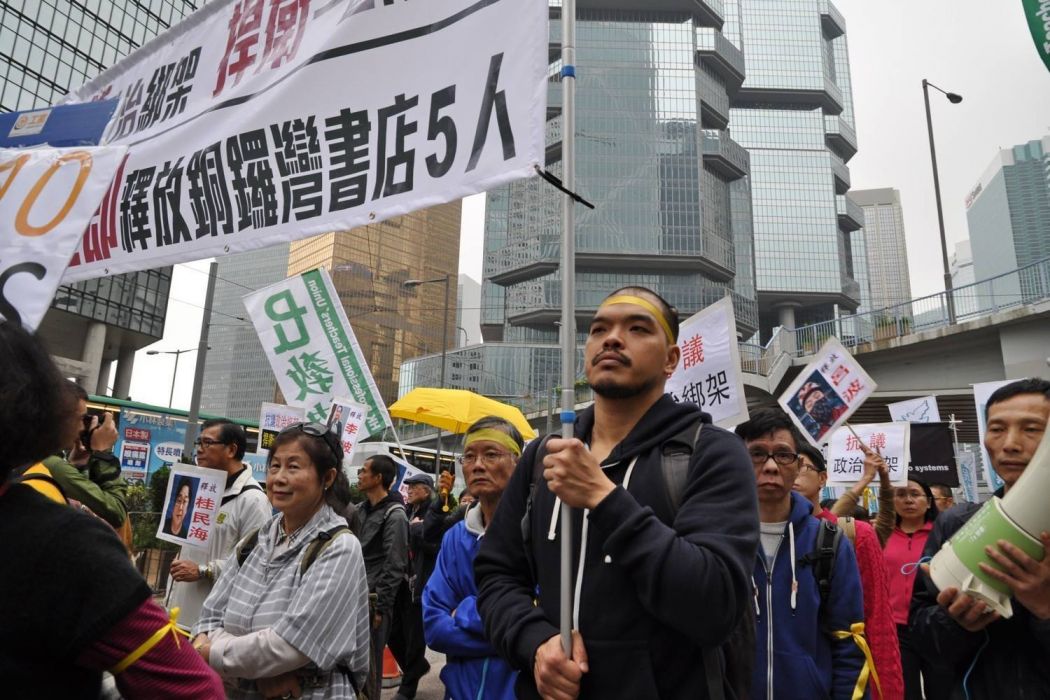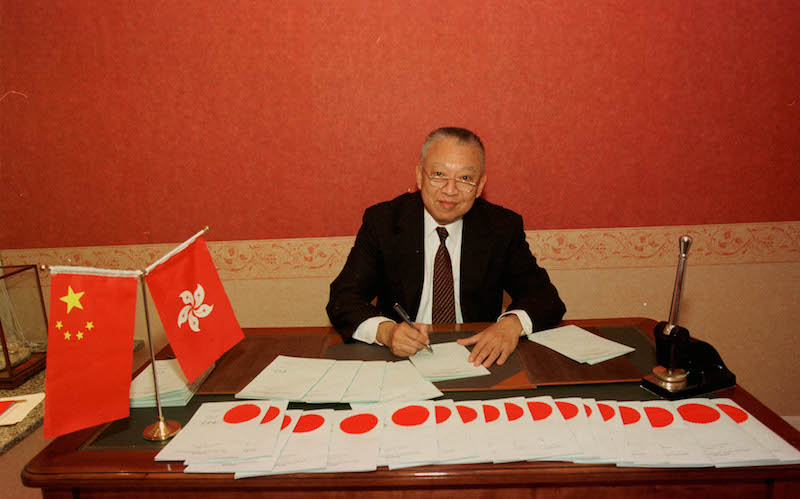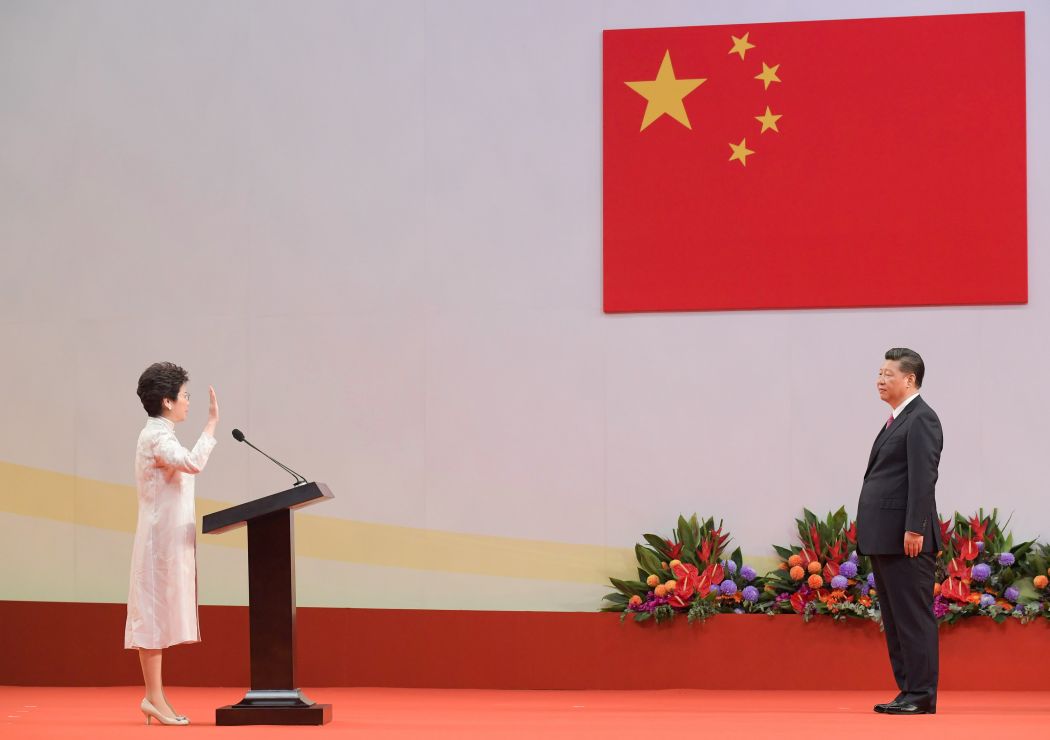It was 7am on May 9, 2002, when police appeared at the door of Fung Ka-keung’s home to arrest him. Fung, then 23, had only slept for three hours because he had been working on a university assignment.
In the early 2000s, the use of pepper spray by police officers was still so uncommon that it made headlines. Arresting a student at their home and putting them before a court on the same day was an even more controversial act.
Three months before his arrest, Fung was the co-organiser of a protest in support of an activist who was jailed for assaulting a police officer by shouting into a loudspeaker at the officer’s face.
Fung became one of three people to be charged under the Public Order Ordinance, a law criticised for curbing protest freedoms, and one which had not been cited in prosecutions since the Handover five years previously.

Fung was charged with assisting the holding of an unauthorised assembly – one of the landmark cases representing a tighter control over society in the 15 years that were to follow.
Speaking to HKFP, Fung says he detects a clear trend over that period, with more people being prosecuted for more serious offences after public protests, culminating in the wholesale use of the law to intimidate and suppress dissent under Leung Chun-ying.
Political fallout: History of the Public Order Ordinance
The Public Order Ordinance was a law set up in the colonial era – following the 1966 Kowloon disturbances and violent 1967 riots – to control public events. But an amendment in 1995 made it more lenient. Protesters would only have to notify the police on paper a week before hosting rallies and marches, but no approval was required.
However, the Provisional Legislative Council, controlled by Beijing, rolled back the law after the Handover in 1997, so that protesters would have to apply for a “letter of no objection.” Organisers failing to receive it would be holding an unauthorised assembly.
Student activists at the time were often involved in protests campaigning for people seeking abode – people whose children were born on the mainland, but were unable to live in Hong Kong following the first Basic Law interpretation by Beijing in 1999. The pro-democracy Hong Kong Federation of Students, which Fung belonged to, had been opposing the Public Order Ordinance and often did not apply for the letter of no objection.

In fact, Fung was one of the seven members of the Federation arrested in June 2000 for a protest on the first anniversary of Beijing’s intervention. Following that, there were even more protests – up to hundreds participating – in support of the students. Ultimately, he was not charged.
“I guess they thought they could mess with students like that, but they did not expect the strong reaction from the public, who sympathised with the students. The pressure was so strong that they could not prosecute,” he told HKFP.
‘Troublemakers’
Another major controversy in July 2000, Fung recalled, provoked the government into taking a more draconian line with prosecutions.
Robert Chung, the director of the Public Opinion Programme of the University of Hong Kong, revealed that the then-chief executive Tung Chee-hwa had tried to halt polling of his popularity and the government’s credibility, through Tung’s top assistant Andrew Lo. An independent committee confirmed the allegations.

After continuous pressure from the Federation of Students throughout the summer break – usually the time when students were less active in protests – the president and vice-president of the university resigned.
“I believe this incident was the reason they realised there was a group of troublemakers that they have to deal with,” Fung said.
But Fung received a lenient sentence for his charge in 2002. He was bound over for a period of three months, and the judge questioned whether a political incident of this kind should be handled by a court.
“The government just had to find a way to take us on. It was a complete loss for them in 2000 – the Federation kept on organising marches without seeking approval – the government can’t lose like that,” Fung said.
The following graph is interactive. Select different items to show or hide them for comparison.
Protest culture entered new heights in 2003 when an unprecedented 500,000 people marched on the streets on July 1, the Handover anniversary day. Their anger was wide-ranging: the SARS epidemic, the housing market crash and the proposed legislation of a national security law stipulated by Article 23 of the Basic Law – a law criticised for its vague definition of sedition and subversion.
The national security law eventually failed, the SARS epidemic subsided, but confidence in the government still dropped to a new low. In 2004 hundreds of thousands of citizens still marched on July 1. But according to police figures, the number of people arrested in 2003 and 2004 at rallies and marches was at a historic low – only three.
Tung Chee-hwa resigned in 2005 citing poor health. But Donald Tsang, a career bureaucrat who became Tung’s successor, started his term with a support rating of over 72 out of 100.

Avery Ng Man-yuen, the chairman of the League of Social Democrats, studied and worked overseas before he returned to Hong Kong in 2006.
“In the later years of the Donald Tsang era, there were more and more social confrontations,” he told HKFP.
There were more large-scale protests. Thousands rallied against the Guangzhou-Shenzhen-Hong Kong Express Rail Link outside the Legislative Council in 2010. Around 400 people were arrested at three major protests in 2011.
“But usually [activists] would be taken away, then released several streets away from the scene; or even though they were arrested on the scene, they would not be prosecuted at all,” he said. “Prosecutions were rare for large-scale events.”
In one case, hundreds of protesters occupied a street in Central after the annual July 1 march in 2011, blocking traffic for hours before 232 were eventually arrested. However, only 19 were prosecuted six months later.

Retributions against protesters
Things changed quickly after then-chief executive Leung Chun-ying came to power in 2012. “There were retributions long after the protests ended,” Ng said.
Protester Melody Chan was arrested and charged in May 2013 for assisting the holding of an unauthorised assembly and taking part in an unauthorised assembly. The charge related the July 1 occupation in 2011, almost two years previously. Chan was then an apprentice lawyer who was a volunteer for the pro-democracy Occupy Central campaign’s secretariat.
Avery Ng also noted the variety of charges being used.
“From committing a nuisance in a public place, or obstructing police officers, to serious offences like assaulting police officers… they will target individual political groups and activists in deriving an endless stream of charges.”

Four days, three cases
Ng was recently charged with three separate offences. The first one was assault for allegedly throwing a “smelly fish sandwich” at Leung Chun-ying – it missed but hit a police officer – during a protest. The second one was for allegedly inciting disorderly conduct in public places during another protest.
The third was for allegedly disclosing the identity of a person that the Independent Commission Against Corruption was investigating – a case which Ng reported to the anti-graft agency himself.
“This is innovative,” he said. “I reported the case, but I turned out to be the one being charged.”
“I believe the Department of Justice’s goal was to try different charges, the more serious the better.”
On May 5, Ng appeared in court twice on the same day for the first two cases. He appeared in court for the third time in four days for the third case on May 8.
“After the Occupy protests, Leung Chun-ying’s strategy was very clear – it was to scare us into not protesting by pursuing every single opportunity.”
Ng was arrested again during a protest at Golden Bauhinia Square on Wednesday. He was released on bail only after being held for more than 24 hours.

‘Besieging protesters’
Brian Fong Chi-hang, associate director of the Academy of Hong Kong Studies at the Education University of Hong Kong, agreed that the government had clearly decided to take a tougher line.
“The rise in the number of arrests and prosecutions – seemingly using more serious charges against protesters – definitely reflects the government’s tough attitude against social movements,” he told HKFP.
“As social order is restored after arresting protesters, they could choose not to prosecute, or they could choose to prosecute with lighter charges like in the past.”
“The government does not try to respond to protesters’ demands, but chooses to besiege protesters. I believe this will not resolve social conflicts,” he added.
As for the incoming leader Carrie Lam, Fong said time would be needed to observe her actions.
“But at least based on her remarks after the election, she is trying to tone down political contradictions, for example saying that Hong Kong independence is not a big problem,” he said.
Fung, currently the chief executive of the Hong Kong Professional Teachers’ Union, said the law had been abused.

“The Public Order Ordinance has always been criticised – it was a relic of the colonial era, it was used to deal with pro-China [rioters] – but it seems the government has internalised this colonial law.”
Fung blames recent confrontation in society on provocative actions by former chief executive Leung Chun-ying.
“Leung Chun-ying viewed people with different opinions as enemies. The police no longer follow principles. Leung achieved his goals by creating confrontation,” he said.

As of Saturday, Leung Chun-ying no longer holds the reigns of power. Carrie Lam took the oath as the city’s new leader in the presence of Chinese President Xi Jinping. In a speech after Lam’s inauguration Xi hailed the status of civil liberties in Hong Kong: “Since the return to the motherland… the people of Hong Kong enjoy more extensive democratic rights and freedoms than at any other time in its history.”

